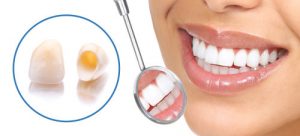
What is a dental crown?
Dental crowns are used in restorative dentistry. It is a type of indirect dental restoration that covers the entire surface of the tooth above the gum line and is commonly used to preserve and restore the strength of a weakened tooth, by restoring the structural integrity, its normal function and appearance of the tooth for improved smile aesthetics.
There are many different reasons as to why a dental crown is the appropriate restorative dental procedure. A dental crown is considered the last resort in tooth preservation, when it is not possible to treat the affected tooth with a dental filling. A dental crown can be required to be placed over a tooth that has had a root canal or a tooth with a large cavity or decay, to strengthen the tooth for normal biting and chewing functions. It may also be recommended to protect and cover a broken/fractured tooth or a discoloured tooth for improved smile aesthetics. Dental crowns for restorative dental purposes can also be employed to secure a dental bridge in place or over a dental implant.
What types of materials are used to make dental crowns?
Dental crowns can be made from various materials.
- Metal Alloy – A metal alloy for a crown can be gold alloy or a base-metal alloy for a silver appearance. Metal dental crowns resist corrosion, tarnishing and breakage. Being the strongest option they tend to last longer than other materials. A metal crowns does not resemble the natural appearance of teeth, hence a consideration if it will show when you smile. Other considerations would be any allergies to the base metal and possible discomfort when the metal dental crown is exposed to hot or cold foods and beverages.
- Porcelain – A porcelain dental crown is the most natural looking as the colour and translucency of the material can be designed to closely match the patient’s surrounding teeth. Having less strength compared to metal alloy, porcelain crowns do not withstand heavy biting or grinding. The natural appearance of the material makes porcelain crowns ideal for treating teeth at the front of the mouth.
- Porcelain Fused to Metal (PFM) – A porcelain fused to metal dental crown creates a more natural looking crown with added strength. A consideration is the increased amount of original tooth that needs to be removed to accommodate this type of dental crown.
- Composite – Dental crowns made from indirect composite material can resemble the colour of teeth, though are not as natural looking as porcelain or as strong.
The dental crown material used is dependent on various factors, including the location of the affected tooth, its oral function and the aesthetic appearance to be achieved.
Are there dental crown problems?
Though a dental crown encircles the natural tooth underneath like a protective cap and restores functionality with biting and chewing by distributing the pressure evenly across the entire tooth, it does not protect the underlying tooth from decay and/or gum disease. The possibility of decay is however minimised, since the dental crown seals the tooth from the rest of the mouth. Hence, as with all teeth, it is important to brush and floss the crowned tooth and ensure good oral hygiene at all times, so as to not to experience further decay and compromise its structural integrity.
Generally, a dental crown can be thought to ‘fail’ over time if it becomes prominent, no longer blending in with the rest of the mouth and teeth. This is usually due to (re-emerging) decay in the supported tooth, changes in the mouth such as receding gums, or discolouration of surrounding teeth making them a different appearance to the dental crown.
With the appropriate level of oral hygience practice and a healthy supporting tooth is maintained, a dental crown may last approximately ten years and highly dependent on a range of individual factors. Regular dental check-up is imperative to ensuring the viability, stability and longevity of the dental crown with timely treatment as required.
When is a crown needed?
If you suspect having a broken tooth or loose filling, arrange a dental check-up at our dental clinic at your earliest convenience. The earlier dental issues are identified, the higher the chance of preserving your natural teeth. Delaying dental treatment for a dental crown may result in the tooth becoming unrepairable, if the weakened tooth enamel breaks apart, exposing the nerve and fracturing.
Please contact our friendly dental team at East Ringwood Dental Clinic on (03) 9870 8243 to discuss your individual dental restorative treatment and aesthetic needs with our experienced dentists.
